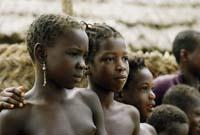Diarrhea vaccine. This time yes?

Scientists have been trying to get an effective rotavirus vaccine for 30 years. These viruses cause severe diarrhea and consequently dehydration, resulting in the deaths of thousands of children a year, especially in developing countries.
The vaccines that have been taken so far are ineffective, so although in one country or another there is some authorization, in general there is no authorized vaccine.
Now, however, two large pharmaceutical establishments, GlaxoSmith Clin (GSK) and Merck, have developed vaccines that say the results are really good. They say they do not produce side effects in children and protect from many variants of rotavirus.
The GSK is called Rotarix and has a rotavirus unable to cause disease. For his part, Mercke collects several rotaviruses of this type, some of them of human origin and others of beef. It is called Rota Teq and by the end of this year it is expected to be in American clinics.
However, some doctors don't expect too much. In fact, the most serious cases occur in developing countries, where sick children are weakened and malnourished. The impact of the vaccine on these children should be seen.





